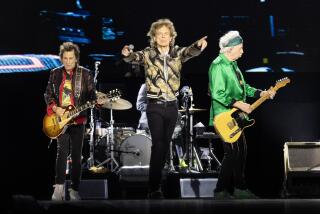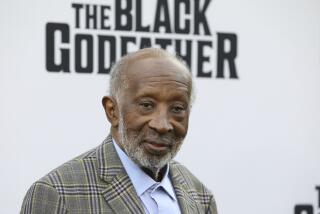Blind Boys of Alabama Share Gospel With Grace, Joy
- Share via
If the Blind Boys of Alabama leader Clarence Fountain had taken a different path in music, he might be one of our great blues or soul singers. His most compelling vocals recall the growling urgency of Howlin’ Wolf and the soulful grace of Solomon Burke.
But you understand why Fountain, who is in his early 70s, has stuck with gospel music for all these years--and why we are better off for it--after his concert with the Blind Boys on Saturday at UCLA’s Royce Hall.
He’s driven by a passion for gospel that enables him to preserve its high-spirited tradition, yet he challenges gospel purists by incorporating elements of pop, rock and blues into his music.
The quintet’s most adventurous experiment was last year’s “Spirit of the Century,” a striking album released by Peter Gabriel’s Real World label and nominated for a Grammy in the traditional soul gospel category.
With producer John Chelew, the Blind Boys--whose history dates back to before World War II and who gained attention in the 1980s for their role in the hit musical “The Gospel at Colonus”--forge a daring blues-gospel synthesis in the album. It balances traditional fare, such as “Nobody’s Fault but Mine,” with songs by Tom Waits, Ben Harper and, most surprisingly, the Rolling Stones (“Just Want to See His Face” from “Exile on Main Street”).
The Blind Boys (minus ailing member George Scott) performed most of the album Saturday, backed by the record’s all-star cast: guitarists David Lindley and John Hammond, harmonica player Charles Musselwhite, bassist Danny Thompson and drummer Michael Jerome.
Their version of Waits’ “Way Down in the Hole,” a warning about keeping Satan at bay, didn’t fully ignite because the arrangement leaned too much on the song’s blues component. The interpretation of Harper’s “Give a Man a Home,” however, was a spectacular mix of styles that turned the song about social responsibility into an inspiring, foot-stomping gospel-soul workout.
Even more daring was a juxtaposition of the sacred and the secular: the lyrics of “Amazing Grace,” that tender and durable gospel tune, with a bluesy version of “House of the Rising Sun,” the classic folk song set in a New Orleans brothel.
The move could have felt gimmicky, but it was done with such dedication and grace that it served as a thoughtful and moving expression of sin and redemption.
*
Fountain isn’t the only marvel in the group. Jimmy Carter, another vintage member, is a born showman with a sweeter, more pure gospel voice than the gritty Fountain. Carter made a series of rapid spins during one song that would have been impressive under any circumstances, but bordered on electrifying given his age and his blindness.
In another joyous segment, Carter, with an aide to help guide him, created a sense of heightened community in the auditorium by moving through the aisles, shaking hands with fans and urging everyone to jump and shout along with him.
The Blind Boys, backed by their own band, leaned toward more standard gospel offerings in the concert’s second half, closing with a haunting and thoughtful version of the tense “The Last Time.” The song has much of the dramatic punch of the Rolling Stones’ song of the same name, but it is a traditional number that has been part of the Blind Boys’ repertoire since at least the 1950s.
In the song’s key line, Fountain, who performed most of the show seated, declared over and over that this night could be the last time we all sing together--addressing the sadness of death while celebrating faith in life eternal.
The song’s captivating balance of competing emotions reminds us why gospel music has been such a powerful force over the years--and why it remains so in the capable hands of the Blind Boys of Alabama.
More to Read
The biggest entertainment stories
Get our big stories about Hollywood, film, television, music, arts, culture and more right in your inbox as soon as they publish.
You may occasionally receive promotional content from the Los Angeles Times.










